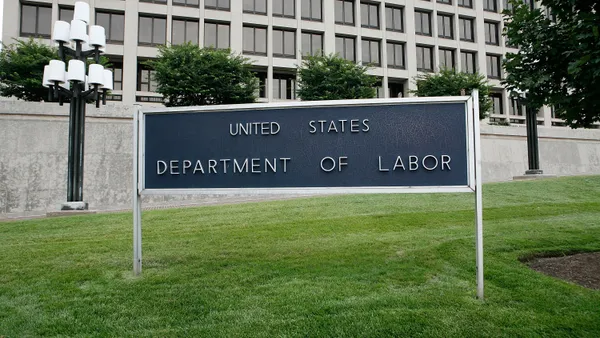Dive Brief:
- Pero Family Farms Food Co. failed to take appropriate corrective action after an employee complained that a co-worker was sexually harassing and physically threatening her, the U.S. Equal Employment Opportunity Commission alleged in a June 15 lawsuit, EEOC v. Pero Family Farms Food Co., LLC.
- Per the complaint, a forklift driver at the company’s Michigan headquarters allegedly made lewd, sexual, insulting and threatening remarks to and about an employee with whom he had a prior romantic relationship. She complained to HR personnel and to her supervisor, who tried to counsel the driver and moved him to a different shift, the EEOC said. But the harassment continued, the agency alleged. When she later reported he threatened to kill her, the HR department allegedly told her she would have to get a restraining order before the company could act, according to the lawsuit. She obtained a protective order, and the company fired the driver but allegedly deemed him eligible for rehire.
- The EEOC sued Pero Farms for subjecting the employee to a sexually hostile work environment in violation of Title VII of the Civil Rights Act of 1964. “An employer may not condone a work environment where a female employee is degraded and threatened because of her sex or wait until it is presented with a protection order before it decides to act,” EEOC attorney Dale Price stated in a press release announcing the lawsuit. Instead employers “must step in to stop such behavior as soon as possible,” Price said. Pero Farms did not respond to a request for a comment prior to press time.
Dive Insight:
Employers that fail to remedy a known or hostile work environment can be liable for violating Title VII, an EEOC guidance states.
This means when an employer receives a complaint or otherwise learns of sexual (or other prohibited) harassment in the workplace, it should investigate promptly and thoroughly, the guidance advises. Employers should also take “immediate and appropriate corrective action” by doing whatever is necessary to end the harassment and prevent it from recurring, it adds.
For example, by taking the following actions, a bank responded promptly and appropriately to an employee’s complaint that a co-worker talked to her about sexual activities and touched her in an offensive manner: It investigated the complaint within four days of learning about the alleged misconduct, reprimanded the co-worker, placed him on probation and warned him that further misconduct could result in termination, the guidance explains.
Employers should also keep in mind that an effective investigation involves several steps, experts say. The key is to conduct a “good faith” review, meaning the investigation must be adequate and thorough, fair and unbiased.
Investigators can start by making a list of witnesses and interview the complaining employee first, experts recommend. During the interview, the investigator should ask the employee if they have texts, emails or videos that can corroborate the complaint.
Witnesses should be interviewed next. Ask them to see if they can corroborate the story; even if they didn’t actually see the alleged action, they may know of several other instances.
Finally, interview the alleged harasser, who may respond with cross-claims of their own. These claims may have to be investigated but shouldn’t stop the current investigation or prevent discipline.
Other points to remember: 1) Don’t promise confidentiality, but make sure employees know they won’t be retaliated against for participating in the investigation; and 2) Maintain strong documentation; have a second person present to witness the interview and take notes.
If the employer determines that misconduct occurred, it should take remedial action reasonably calculated to end the misconduct. Even if the determination later turns out to be wrong, a good-faith investigation will help protect the employer from liability, attorneys have said.













